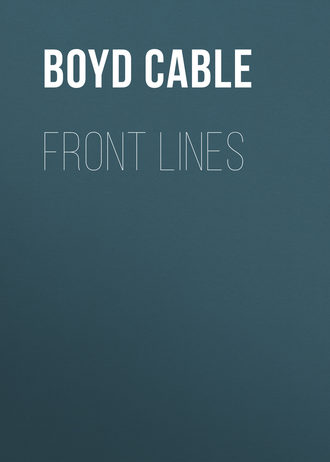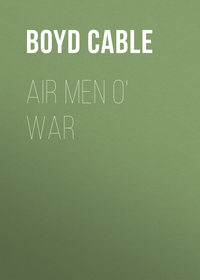
Front Lines
The Lieutenant halted abruptly. “Did you see anyone move?” he asked the Signaller, who, of course, being behind the officer in the trench, had seen nothing, and said so. They pushed along the trench, and, coming to the spot where the figure had vanished, found the opening to a dug-out with a long set of stairs vanishing down into the darkness. Memories stirred in the officer’s mind of tales about Germans who had “lain doggo” in ground occupied by us, and had, over a buried wire, kept in touch with their batteries and directed their fire on to our new positions, and this, with some vague instinct of the chase, prompted the decision he announced to his Signaller that he was “going down to have a look.”
“Better be careful, sir,” said the Signaller. “You don’t know if the gas has cleared out of a deep place like that.” This was true, because a good deal of gas had been sent over in the attack of the day before, and the officer began to wonder if he’d be a fool to go down. But, on the other hand, if a German was there he would know there was no gas, and, anyhow, it was a full day since the gas cloud went over. He decided to chance it.
“You want to look out for any Boshies down there, sir,” went on the Signaller. “With all these yarns they’re fed with, about us killin’ prisoners, you never know how they’re goin’ to take it, and whether they’ll kamerad or make a fight for it.”
This also was true, and since a man crawling down a steep and narrow stair made a target impossible for anyone shooting up the tunnel to miss, the Lieutenant began to wish himself out of the job. But something, partly obstinacy, perhaps partly an unwillingness to back down after saying he would go, made him carry on. But before he started he took the precaution to push a sandbag off where it lay on the top step, to roll bumping and flopping down the stairs. If the Boche had any mind to shoot, he argued to himself, he’d almost certainly shoot at the sound, since it was too dark to see. The sandbag bumped down into silence, while the two stood straining their ears for any sound. There was none.
“You wait here,” said the Lieutenant, and, with his cocked pistol in his hand, began to creep cautiously down the stairs. The passage was narrow, and so low that he almost filled it, even although he was bent nearly double, and as he went slowly down, the discomforting thought again presented itself with renewed clearness, how impossible it would be for a shot up the steps to miss him, and again he very heartily wished himself well out of the job.
It was a long stair, fully twenty-five to thirty feet underground he reckoned by the time he reached the foot, but he found himself there and on roughly levelled ground with a good deal of relief. Evidently the Boche did not mean to show fight, at any rate, until he knew he was discovered. The Lieutenant knew no German, but made a try with one word, putting as demanding a tone into it as he could – “Kamerad!” He had his finger on the trigger and his pistol ready for action as he spoke, in case a pot-shot came in the direction of the sound of his voice.
There was a dead, a very dead and creepy silence after his word had echoed and whispered away to stillness. He advanced a step or two, feeling carefully foot after foot, with his left hand outstretched and the pistol in his right still ready. The next thing was to try a light. This would certainly settle it one way or the other, because if anyone was there who meant to shoot, he’d certainly loose off at the light.
The Lieutenant took out his torch and held it out from his body at full arm’s length, to give an extra chance of the bullet missing him if it were shot at the light. He took a long breath, flicked the light on in one quick flashing sweep round, and snapped it out again. There was no shot, no sound, no movement, nothing but that eerie stillness. The light had given him a glimpse of a long chamber vanishing into dimness. He advanced very cautiously a few steps, switched the light on again, and threw the beam quickly round the walls. There was no sign of anyone, but he could see now that the long chamber curved round and out of sight.
He switched the light off, stepped back to the stair foot, and called the Signaller down, hearing the clumping sound of the descending footsteps and the man’s voice with a childish relief and sense of companionship. He explained the position, threw the light boldly on, and pushed along to where the room ran round the corner. Here again he found no sign of life, but on exploring right to the end of the room found the apparent explanation of his failure to discover the man he had been so sure of finding down there. The chamber was a long, narrow one, curved almost to an S-shape, and at the far end was another steep stair leading up to the trench. The man evidently had escaped that way.
The dug-out was a large one, capable of holding, the Lieutenant reckoned, quarters for some thirty to forty men. It was hung all round with greatcoats swinging against the wall, and piled on shelves and hanging from hooks along wall and roof were packs, haversacks, belts, water-bottles, bayonets, and all sorts of equipment. There were dozens of the old leather “pickelhaube” helmets, and at sight of these the Lieutenant remembered an old compact made with the others in Mess that if one of them got a chance to pick up any helmets he should bring them in and divide up.
“I’m going to take half a dozen of those helmets,” he said, uncocking his pistol and pushing it into the holster.
“Right, sir,” said the Signaller. “I’d like one, too, and we might pick up some good sooveneers here.”
“Just as well, now we are here, to see what’s worth having,” said the Lieutenant. “I’d rather like to find a decent pair of field-glasses, or a Mauser pistol.”
He held the light while the Signaller hauled down kits, shook out packs, and rummaged round. For some queer reason they still spoke in subdued tones and made little noise, and suddenly the Lieutenant’s ears caught a sound that made him snap his torch off and stand, as he confesses, with his skin pringling and his hair standing on end.
“Did you hear anything?” he whispered. The Signaller had stiffened to stock stillness at his first instinctive start and the switching off of the light, and after a long pause whispered back, “No, sir; but mebbe you heard a rat.”
“Hold your breath and listen,” whispered the Lieutenant. “I thought I heard a sort of choky cough.”
He heard the indrawn breath and then dead silence, and then again – once more the hair stirred on his scalp – plain and unmistakable, a sound of deep, slow breathing. “Hear it?” he said very softly. “Sound of breathing,” and “Yes, believe I do now,” answered the Signaller, after a pause. They stood there in the darkness for a long minute, the Lieutenant in his own heart cursing himself for a fool not to have thoroughly searched the place, to have made sure they would not be trapped.
Especially he was a fool not to have looked behind those great coats which practically lined the walls and hung almost to the floor. There might be a dozen men hidden behind them; there might be a door leading out into another dug-out; there might be rifles or pistols covering them both at that second, fingers pressing on the triggers. He was, to put it bluntly, “scared stiff,” as he says himself, but the low voice of the Signaller brought him to the need of some action. “I can’t hear it now, sir.”
“I’m going to turn the light on again,” he said. “Have a quick look round, especially for any men’s feet showing under the coats round the wall.” He switched his torch on again, ran it round the walls, once, swiftly, and then, seeing no feet under the coats, slowly and deliberately yard by yard.
“I’ll swear I heard a man breathe,” he said positively, still peering round. “We’ll search the place properly.”
In one corner near the stair foot lay a heap of clothing of some sort, with a great-coat spread wide over it. It caught the Lieutenant’s eye and suspicions. Why should coats be heaped there – smooth – at full length?
Without moving his eyes from the pile, he slid his automatic pistol out again, and slipped off the safety catch. “Keep the light on those coats,” he said, softly, and tip-toed over to the pile, the pistol pointed, his finger close and tight on the trigger. His heart was thumping uncomfortably, and his nerves tight as fiddle-strings. He felt sure somehow that here was one man at least; and if he or any others in the dug-out meant fight on discovery, now, at any second, the first shot must come.
He stooped over the coats and thrust the pistol forward. If a man was there, had a rifle or pistol ready pointed even, at least he, the Lieutenant, ought to get off a shot with equal, or a shade greater quickness. With his left hand he picked up the coat corner, turned it back, and jerked the pistol forward and fairly under the nose of the head his movement had disclosed. “Lie still,” he said, not knowing or caring whether the man understood or not, and for long seconds stood staring down on the white face and into the frightened eyes that looked unblinking up at him.
“Kamerad,” whispered the man, still as death under the threat of that pistol muzzle and the finger curled about the trigger. “Right,” said the Lieutenant. “Kamerad. Now, very gently, hands up,” and again, slowly and clearly, “Hands up.” The man understood, and the Lieutenant, watching like a hawk for a suspicious movement, for sign of a weapon appearing, waited while the hands came slowly creeping up and out from under the coat. His nerves were still on a raw edge – perhaps because long days of observing in the front lines or with the battery while the guns are going their hardest in a heavy night-and-day bombardment are not conducive to steadiness of nerves – but, satisfied at last that the man meant to play no tricks, he flung the coat back off him, made him stand with his hands up, and ran his left hand over breast and pockets for feel of any weapon. That done, he stepped back with a sigh of relief. “Phew! I believe I was just about as cold scared as he was,” he said. “D’you speak English? No. Well, I suppose you’ll never know how close to death you’ve been the last minute.”
“I was a bit jumpy, too, sir,” said the Signaller. “You never know, and it doesn’t do to take chances wi’ these chaps.”
“I wasn’t,” said the Lieutenant. “I believe, if I’d seen a glint of metal as his hands came up, I’d have blown the top of his blessed head off. Pity he can’t speak English.”
“Mans,” said the prisoner, nodding his head towards the other end of the dug-out. “Oder mans.”
The Lieutenant whipped round with a startled exclamation. “What, more of ’em. G’ Lord! I’ve had about enough of this. But we’d better make all safe. Come on, Fritz; lead us to ’em. No monkey tricks, now,” and he pushed his pistol close to the German’s flinching head. “Oder mans, kamerad, eh? Savvy?”
“Ge-wounded,” said the prisoner, making signs to help his meaning. Under his guidance and with the pistol close to his ear all the time, they pulled aside some of the coats and found a man lying in a bunk hidden behind them. His head was tied up in a soaking bandage, the rough pillow was wet with blood, and by all the signs he was pretty badly hit. The Lieutenant needed no more than a glance to see the man was past being dangerous, so, after making the prisoner give him a drink from a water-bottle, they went round the walls, and found it recessed all the way round with empty bunks.
“What a blazing ass I was not to hunt round,” said the Lieutenant, puffing another sigh of relief as they finished the jumpy business of pulling aside coat after coat, and never knowing whether the movement of any one of them was going to bring a muzzle-close shot from the blackness behind. “We must get out of this, though. It’s growing late, and the Battery will be wondering and thinking we’ve got pipped on the way back.”
“What about these things, sir?” said the Signaller, pointing to the helmets and equipment they had hauled down.
“Right,” said the Lieutenant; “I’m certainly not going without a souvenir of this entertainment. And I don’t see why Brother Fritz oughtn’t to make himself useful. Here, spread that big ground-sheet – ”
So it came about that an hour after a procession tramped back through the lines of the infantry and on to the gun lines – one German, with a huge ground-sheet, gathered at the corners and bulging with souvenirs, slung over his shoulder, the Lieutenant close behind him with an automatic at the ready, and the Signaller, wearing a huge grin, and with a few spare helmets slung to his haversack strap.
“I thought I’d fetch him right along,” the Lieutenant explained a little later to the O.C. Battery. “Seeing the Battery’s never had a prisoner to its own cheek, I thought one might please ’em. And, besides, I wanted him to lug the loot along. I’ve got full outfits for the mess this time, helmets and rifles and bayonets and all sorts.”
The Battery were pleased. The Gunners don’t often have the chance to take prisoners, and this one enjoyed all the popularity of a complete novelty. He was taken to the men’s dug-out, and fed with a full assignment of rations, from bacon and tea to jam and cheese, while the men in turn cross-questioned him by the aid of an English-French-German phrase-book unearthed by some studious gunner.
And when he departed under escort to be handed over and join the other prisoners, the Battery watched him go with complete regret.
“To tell the truth, sir,” the Sergeant-Major remarked to the Lieutenant, “the men would like to have kept him as a sort of Battery Souvenir – kind of a cross between a mascot and a maid-of-all-work. Y’see, it’s not often – in fact, I don’t know that we’re not the first Field Battery in this war to bring in a prisoner wi’ arms, kit, and equipment complete.”
“The first battery,” said the Lieutenant fervently, “and when I think of that minute down a deep hole in pitch dark, hearing someone breathe, and not knowing – well, we may be the first battery, and, as far as I’m concerned, we’ll jolly well be the last.”
XV
OUR TURN
No. II platoon had had a bad mauling in their advance, and when they reached their “final objective line” there were left out of the ninety-odd men who had started, one sergeant, one corporal, and fourteen men. But, with the rest of the line, they at once set to work to consolidate, to dig in, to fill the sandbags each man carried, and to line the lip of a shell crater with them. Every man there knew that a counter-attack on their position was practically a certainty. They had not a great many bombs or very much ammunition left; they had been struggling through a wilderness of sticky mud and shell-churned mire all day, moving for all the world like flies across a half-dry fly-paper; they had been without food since dawn, when they had consumed the bully and biscuit of their iron “ration”; they were plastered with a casing of chilly mud from head to foot; they were wet to the skin; brain, body, and bone weary.
But they went about the task of consolidating with the greatest vigour they could bring their tired muscles to yield. They worried not at all about the shortage of bombs and ammunition, or lack of food, because they were all by now veterans of the new “planned” warfare, knew that every detail of re-supplying them with all they required had been fully and carefully arranged, that these things were probably even now on the way to them, that reinforcements and working parties would be pushed up to the new line as soon as it was established. So the Sergeant was quite willing to leave all that to work out in its proper sequence, knew that his simple job was to hold the ground they had taken, and, therefore, bent all his mind to that work.
But it suddenly appeared that the ground was not as completely taken as he had supposed. A machine-gun close at hand began to bang out a string of running reports; a stream of bullets hissed and whipped and smacked the ground about him and his party. A spasmodic crackle of rifle-fire started again farther along the line at the same time. The Sergeant paid no heed to that. He and his men had flung down into cover, and dropped spades and trenching tools and sandbags, and whipped up their rifles to return the fire, at the first sound of the machine-gun.
The Sergeant peered over the edge of the hole he was in, locating a bobbing head or two and the spurting flashes of the gun, and ducked down again. “They’re in a shell-hole not more’n twenty, thirty yards away,” he said rapidly. “Looks like only a handful. We’ll rush ’em out. Here – ” and he went on into quick detailed orders for the rushing. Three minutes later he and his men swarmed out of their shelter and went forward at a scrambling run, the bombers flinging a shower of grenades ahead of them, the bayonet men floundering over the rough ground with weapons at the ready, the Sergeant well in the lead.
Their sudden and purposeful rush must have upset the group of Germans, because the machine-gun fire for a moment became erratic, the muzzle jerked this way and that, the bullets whistled wide, and during that same vital moment no bombs were thrown by the Germans; and when at last they did begin to come spinning out, most of them went too far, and the runners were well over them before they had time to explode. In another moment the Sergeant leaped down fairly on top of the machine-gun, his bayonet thrusting through the gunner as he jumped. He shot a second and bayoneted a third, had his shoulder-strap blown away by a rifle at no more than muzzle distance, his sleeve and his haversack ripped open by a bayonet thrust.
Then his men swarmed down into the wide crater, and in two minutes the fight was over. There were another few seconds of rapid fire at two or three of the Germans who had jumped out and run for their lives, and that finished the immediate performance. The Sergeant looked round, climbed from the hole, and made a hasty examination of the ground about them.
“’Tisn’t as good a crater as we left,” he said, “an’ it’s ’way out front o’ the line the others is digging, so we’d best get back. Get a hold o’ that machine-gun an’ all the spare ammunition you can lay hands on. We might find it come in useful. Good job we had the way a Fritz gun works shown us once. Come on.”
The men hastily collected all the ammunition they could find and were moving back, when one of them, standing on the edge of the hole, remarked: “We got the top o’ the ridge all right this time. Look at the open flat down there.”
The Sergeant turned and looked, and an exclamation broke from him at sight of the view over the ground beyond the ridge. Up to now that ground had been hidden by a haze of smoke from the bursting shells where our barrage was pounding steadily down. But for a minute the smoke had lifted or blown aside, and the Sergeant found himself looking down the long slope of a valley with gently swelling sides, looking right down on to the plain below the ridge. He scanned the lie of the ground rapidly, and in an instant had made up his mind. “Hold on there,” he ordered abruptly; “we’ll dig in here instead. Sling that machine-gun back in here and point her out that way. You, Lees, get ’er into action, and rip out a few rounds just to see you got the hang o’ it. Heave those dead Boches out; an’, Corporal, you nip back with half a dozen men and fetch along the tools and sandbags we left there. Slippy now.”
The Corporal picked his half-dozen men and vanished, and the Sergeant whipped out a message-book and began to scribble a note. Before he had finished the rifle-fire began to rattle down along the line again, and he thrust the book in his pocket, picked up his rifle, and peered out over the edge of the hole. “There they go, Lees,” he said suddenly. “Way along there on the left front. Pump it into ’em. Don’t waste rounds, though; we may need ’em for our own front in a minute. Come on, Corporal, get down in here. Looks like the start o’ a counter-attack, though I don’t see any of the blighters on our own front. Here, you two, spade out a cut into the next shell-hole there, so’s to link ’em up. Steady that gun, Lees; don’t waste ’em. Get on to your sandbag-fillin’, the others, an’ make a bit o’ a parapet this side.”
“We’re a long ways out in front of the rest o’ the line, ain’t we?” said the Corporal.
“Yes, I know,” said the Sergeant. “I want to send a message back presently. This is the spot to hold, an’ don’t you forget it. Just look down – hullo, here’s our barrage droppin’ again. Well, it blots out the view, but it’ll be blottin’ out any Germs that try to push us; so hit ’er up, the Gunners. But – ” He broke off suddenly, and stared out into the writhing haze of smoke in front of them. “Here they come,” he said sharply. “Now, Lees, get to it. Stand by, you bombers. Range three hundred the rest o’ you, an’ fire steady. Pick your marks. We got no rounds to waste. Now, then – ”
The rifles began to bang steadily, then at a rapidly increasing rate as the fire failed to stop the advance, and more dim figures after figures came looming up hazily and emerging from the smoke. The machine-gunner held his fire until he could bring his sights on a little group, fired in short bursts with a side-ways twitch that sprayed the bullets out fan-wise as they went. The rifle-fire out to right and left of them, and almost behind them, swelled to a long, rolling beat with the tattoo of machine-guns rapping through it in gusts, the explosions of grenades rising and falling in erratic bursts.
Farther back, the guns were hard at it again, and the shells were screaming and rushing overhead in a ceaseless torrent, the shrapnel to blink a star of flame from the heart of a smoke-cloud springing out in mid-air, the high explosive crashing down in ponderous bellowings, up-flung vivid splashes of fire and spouting torrents of smoke, flying mud and earth clods. There were German shells, too, shrieking over, and adding their share to the indescribable uproar, crashing down along the line, and spraying out in circles of fragments, the smaller bits whistling and whizzing viciously, the larger hurtling and humming like monster bees.
“Them shells of ours is comm’ down a sight too close to us, Sergeant,” yelled the Corporal, glancing up as a shrapnel shell cracked sharply almost overhead and sprayed its bullets, scattering and splashing along the wet ground out in front of them.
“All right – it’s shrap,” the Sergeant yelled back. “Bullets is pitchin’ well forrad.”
The Corporal swore and ducked hastily from the whitt-whitt of a couple of bullets past their ears. “Them was from behind us,” he shouted. “We’re too blazin’ far out in front o’ the line here. Wot’s the good – ”
“Here,” said the Sergeant to a man who staggered back from the rough parapet, right hand clutched on a blood-streaming left shoulder, “whip a field dressin’ round that, an’ try an’ crawl back to them behind us. Find an officer, if you can, an’ tell him we’re out in front of ’im. An’ tell ’im I’m going to hang on to the position we have here till my blanky teeth pull out.”
“Wot’s the good – ” began the Corporal again, ceasing fire to look round at the Sergeant.
“Never mind the good now,” said the Sergeant shortly, as he recharged his magazine. “You’ll see after – if we live long enough.” He levelled and aimed his rifle. “An’ we won’t do that if you stand there” – (he fired a shot and jerked the breech open) – “jawin’ instead” – (he slammed the breech-bolt home and laid cheek to stock again) – “o’ shootin’”; and he snapped another shot.
On their own immediate front the attack slackened, and died away, but along the line a little the Sergeant’s group could see a swarm of men charging in. The Sergeant immediately ordered the machine-gun and every rifle to take the attackers in enfilade. For the next few minutes every man shot as fast as he could load and pull trigger, and the captured machine-gun banged and spat a steady stream of fire. The Sergeant helped until he saw the attack dying out again, its remnants fading into the smoke haze. Then he pulled his book out, and wrote his message: “Am holding crater position with captured machine-gun and eight men of No. 2 Platoon. Good position, allowing enfilade fire on attack, and with command of farther slopes. Urgently require men, ammunition, and bombs, but will hold out to the finish.”
He sent the note back by a couple of wounded men, and set his party about strengthening their position as far as possible. In ten minutes another attack commenced, and the men took up their rifles and resumed their steady fire. But this time the field-grey figures pressed in, despite the pouring fire and the pounding shells, and, although they were held and checked and driven to taking cover in shell-holes on the Sergeant’s immediate front, they were within grenade-throwing distance there, and the German “potato-masher” bombs and the British Mills’ began to twirl and curve over to and fro, and burst in shattering detonations. Three more of the Sergeant’s party were wounded inside as many minutes, but every man who could stand on his feet, well or wounded, rose at the Sergeant’s warning yell to meet the rush of about a dozen men who swung aside from a large group that had pressed in past their flank. The rush was met by a few quick shots, but the ammunition for the machine-gun had run out, and of bombs even there were only a few left. So, in the main, the rush was met with the bayonet – and killed with it. The Sergeant still held his crater, but now he had only two unwounded men left to help him.





